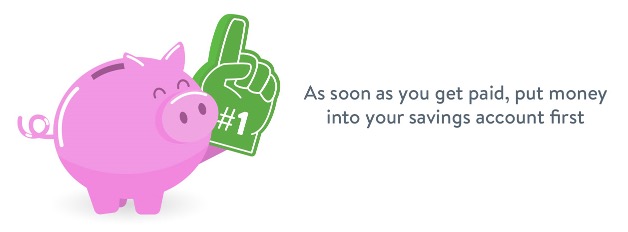-
Personal
Banking
Mortgages
-
Agribusiness
Mortgages
Loans
Farm Transition Program
-
Commercial
Banking
Mortgages
Loans
Business Services
-
Investing
Products -
Community
Community Development
Sponsorship and Donations
Financial Literacy
Volunteerism
Community Reports
Scholarships
Building Communities Grant Program
-
About
Our Roots
Our Communities
Annual Reports
Careers
Diversity and Inclusion
Credit Union Frequently Asked Questions

- Blog
- Save Money
- Pay Yourself First
AUTHOR: BRUCE LUEBKE, COMMUNICATIONS AND CONTENT COORDINATOR
Saving money is something that seems relatively easy to grasp, and yet remains extremely difficult to put into practice. It's a little like getting regular exercise or eating healthy – we all know we should do it, and yet can't seem to find an excellent way to stay on course.
The approach of paying yourself first is something we touched on in a previous article on budgeting. It essentially is giving your contribution to monthly savings the same priority as your living expenses. It is an effective strategy that can be used for your short and long-term goals. As soon as you get paid, put money into your savings account first. That's right; pay yourself first before you pay bills, buy groceries or do anything else with your paycheque. $100 is a good starting point, but even a smaller amount will add up over time.
If you find it difficult (or easy, depending on your perspective) to spend that money rather than put it into your savings account? Put your savings' plan on autopilot by having a portion of your paycheque deposited directly into your savings account. If you are unable to do that through your employer, set up an automatic repeating transfer from your chequing account to your savings account shortly after each payday. Additionally, take advantage of any retirement savings plans offered through your employer, especially if they include an employer match.

By automating your savings contributions, you no longer need to rely on willpower alone. You can sidestep the internal struggle and take the pressure off your self-control. It also allows you to develop the habit, which leads to your treating your savings with the same importance and priority as a bill.
Once your automatic savings plan is in place, look for other ways to make additional contributions to your savings accounts. Income tax refunds, work bonuses, and even the contents of your spare change jar can make a difference if you deposit those funds into your savings account.
Watching the number rise beside your savings goals makes you feel engaged. It boosts motivation, which often translates into even more savings progress. Putting $100 into savings each paycheque (biweekly for most of us) will allow you to save $13,000 in five years. And that doesn't include any interest or additional funds you may have contributed. Putting those contributions into a different savings account (such as a Tax-Free Savings Account (TFSA), Term Deposit or Guaranteed Income Certificate (GIC)) where the interest rate is higher could generate an even larger rate of return above and beyond your biweekly contribution.
Contributing to your savings goals BEFORE allocating any spending money, you get to shop knowing you're not shortchanging your short or long-term goals.

